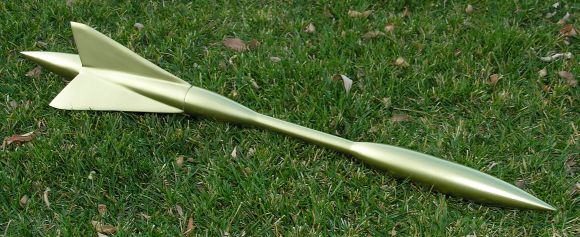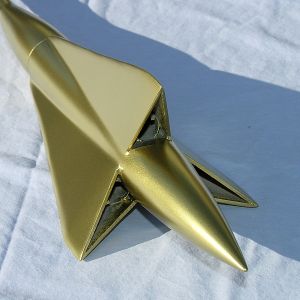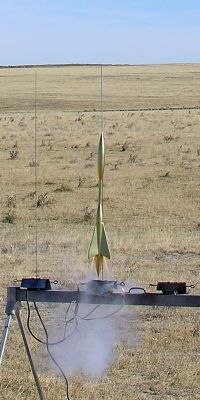| Manufacturer: | Scratch |
Brief:
The Trion is a retro-futuristic scratch build designed around the FlisKits Tres motor mount. The construction will be very difficult for builders without a high or expert experience level.

Construction:
Here is a list of parts, with part numbers referring to parts from Balsa Machining Service, Fliskits, etc.:
- 2 Nose cones, BMS CENV2NC
- 2 Boat tails, BMS CENV2BT
- Tube, BMS BT60 T60-34 8.5 inches
- Tube, BMS BT20 T20-34 29.5 inches
- 3 Engine hooks, BMS EH275
- 3 Engine blocks, BMS EB18-P
- Launch lug, BMS LL316-200
- Balsa, BMS BSH18336 1/8 x 3 x 24
- Screw eye, Fliskits SE-S
- 18in Parachute (not nylon to conserve space), any vendor
- Kevlar, Fliskits SLK-08-288 3 feet
- Tres 18mm Motor Mount, Fliskits
- Nose weight (fishing bullet weight sinkers), 1 3/8 oz

The only legitimate way I know to obtain the Tres motor mount is to buy a Tres and cannibalize the motor mount.
Before beginning, note one confusing aspect of the instructions below: the parts called "nose cones" create the nose and tail of the rocket. The parts called "tail cones" (with holes all the way through) create the transitions.
Begin by assembling the motor mount. Glue in the engine blocks. Tape and glue the engine hooks, noting the following two "gotchas": First, the three hooks should lie on the outside edges of the motor tubes (e.g., the surfaces most distant from the central axis). Second, leave a very generous length of unattached hook so that motors are very easy to insert. This helps because inserting motors will be tricky with adult fingers so you don't want to be fighting stiff motor hooks. Finally, make a small hole in the upper centering ring and tie the Kevlar thread through it. Secure it with a drop of CA.
Cut 7 inches of BT-60 tube. Use the Tres tube cutting template upside down to trace out the aft half of three ellipses. The bottom edge of the ellipses should be about 1/8 inch above the aft end of the tube. Now use the template right side up and complete the forward half of the ellipses. Now slit the tube at the aft end of each ellipse. You'll repair those slits later after the motor mount is positioned.
Next test fit the motor mount. Actually, don't bother because the ellipses will be too narrow. Widen them with a Dremel or knife, say about 1/16 on each side. Test fit the motor mount. Remove and widen by 1/16 each side again. Repeat until the motor mount fits snugly without stretching the aft end of the ellipses. Ideally, the motor tubes should stick out a bit from the face of the tube to reduce heat damage so if you err, err in this direction. Make sure the slitted portions fit well then glue the motor mount in place.
Cut six fins using the enclosed template or the RockSim file. Make plumb guide lines for each fin assembly originating at the center of each motor tube. Glue the fins to the rocket as shown in the photos. This can be quite tricky. If you are adventurous, you can add a gentle curve to the root edge of each fin to allow it to curve around the tube slightly. This would aid fin mounting by reducing fin bending/twisting. Bevel the outside edges so that they will fit smoothly together with a flat surface to glue. Here is my suggestion about how to glue the fins in place: Position two fins as desired. Mark where their aft edges fit on the body tube. Set the fins aside and draw two more guidelines connecting the aft marks to the forward centering line. Repeat with the other fins before gluing anything. Next, hold two fins in position against the aft tube end with your left hand keeping everything in place and keeping the outer edges touching and centered. With your right hand, grasp the leading points of the fins and pinch them together to meet at the forward guide mark. With your third hand, apply some dots of CA at the tips and at the outer edges. Hope the whole assembly holds while the CA dries. After gently detaching your skin from the CA, you can glue the whole assembly completely with yellow or white glue for strength. If you don't have three hands or a spouse, try using a very tight rubber band to hold the forward end. When you are done with the fins, fill and fillet everything for a seamless look. The motor tubes will be somewhat recessed in the fin assemblies.
Next, prepare to attach one nose cone (the one that will be the tail). Sand down the shoulder sufficiently so it will fit. The motor tubes will also prevent cone insertion, so grind away conic sections on the nose shoulder until everything fits. Ideally, sand subtle round depressions in the wide portion of the nose cone so that the cone surface gently avoids the blast of the motors. Keep these subtle to avoid ruining the sleek look.
Next, cut two equal sections of BT-20 tube, each about 15 inches. Slit one tube lengthwise, and remove enough material lengthwise along the slit so that this tube can slide completely within the other. (I think it works out to be almost 1/4 inch, but go slowly until you get it just right.) Next is a tricky part: you want to glue the one tube completely within the other. Do this over newspaper. The key point is to beware of binding. I think the best method is to dredge the inside of the outer tube and the outside of the inner tube with excessive amounts of white glue (not yellow glue!) Position the outer tube vertically against a hard, covered surface. In a single extremely swift and very firm thrust, push the inner tube inside. Do not hesitate at any point or you are doomed. If you get it in all the way, wipe away all the extra glue and let it dry. If you failed, try again with new tubes. The exact length of finished double-wall tubing is not terribly important so if you get it close, just trim away any odd ends.
Glue the double-walled tube into each of the tail cones (the balsa cones with holes all the way through them) with the wide cone ends toward the outside. The tube can be flush with the wide ends of the cones or a bit less. However, you need a considerable length inserted to make it strong enough. Using coarse sandpaper and a lot of patience, sand away the excess balsa at the narrow ends of the tail cones to obtain nice smooth transitions. As you get close, fill the joint with wood filler to help get a seamless look.
The rocket separates at the aft end of the aft transition. Sand down the shoulder of that tail cone to 5/8 in. Attach the screw eye to this shoulder. Tie a loop midway in the Kevlar® then tie the end to the screw eye. Ideally, add a length of elastic before you do this to help prevent zipper damage. Assemble the parachute and tie it to the shock cord loop.
Sand down the shoulder of the upper transition to 1/2 in. Glue the remaining 1 1/2 inches of BT-60 tube onto this shoulder.
Sand down the shoulder of the remaining nose cone to 1/2 in. Drill out a bit of a hole and glue in the nose weight. Dry fit the whole rocket. With no motors, the balancing point of the fully assembled rocket should be roughly at the forward edge of the aft transition. Adjust the nose weight to achieve this then glue in the forward nose cone.
Finishing:
Sand and fill everything; prime and paint it. You're ready to fly!

Flight and Recovery:
All three of my flights were on a trio of C6-5 motors. Dealing with the motors can be tricky. For instance, needle-nose pliers are required to extract the motors after flight. I would never advocate messing with commercial motors. However, let me just mention that if someone were crazy enough to peel away some outer paper layers from each motor in complete disregard of all regulations and common sense, he would find the motors to be much easier to insert and extract.
Prepping the recovery system is straightforward. I used a homemade mylar chute because the storage space is very tight. Cellulose insulation wadding protected the chute.
Having documented the build on TRF and winning a Design of the Month contest, the rocket (in its sleek gold finish) was first inspected by members of my local club before launch.
The first flight was perfect except that we were surprised to see that the rocket had a strong spin. Upon recovery, I found that there was some blistering of the paint next to the motors, but it wasn't too bad. The second flight was a repeat of the first, but the chute melted a bit on ejection and the harder landing broke off the tip of one fin assembly. I took this opportunity to completely remove all the fins and start from scratch, hopefully to prevent the spin. After a couple months in the shop, the Trion went for a third flight. Boost was very nice again with a weak spin. Recovery was perfect.
At this point, the Trion still looks great. I can't decide whether to retire it while it's still undamaged, or perhaps to keep flying until destruction. Well, the decision isn't too tough--rockets are meant to fly!
 |
 |
E. Kociba (April 18, 2012)
I keep clicking on this review just to look at this rocket! It looks great!
Sponsored Ads
 |
 |












woody (July 30, 2011)
Try mounting a small clear plastic tab made from a soda bottle attach on one of the fins to counter act the spin. It worked for me on a rocket. The tab I made for my rocket was no bigger than 1/16 by 1/2 inch bent at an angle 1/8 above the fillet.
NICE WORK by the way. I like it I might get one. It makes me think of the old scifi-movies of the 30-50's. I love the gold finish.